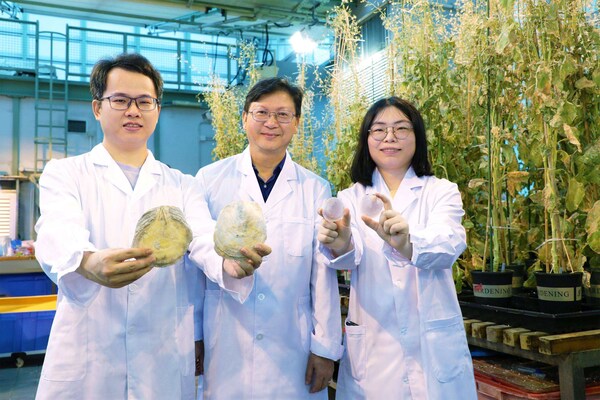HONG KONG, Dec. 16, 2024 /PRNewswire/ -- Biologists from Hong Kong Baptist University (HKBU) have discovered two new species of windowpane shell at Mai Po, Hong Kong and in the South China Sea. Also known as the windowpane oyster or capiz shell, the windowpane shell is a small group of saltwater bivalves belonging to the genus Placuna under the family Placunidae. Their discovery brings the total number of species in this genus from five to seven worldwide.

Professor Qiu Jianwen (centre), Lin Yitao (left), PhD student, and Li Yixuan (right), Post-doctoral Research Fellow of the Department of Biology of HKBU have discovered two new species of windowpane shell from Hong Kong and in the South China Sea.
The HKBU research team, led by Professor Qiu Jianwen, Professor of the Department of Biology at HKBU, has named the new species Placuna aestuaria and Placuna vitream. Their findings have been published in the academic journal Ecology and Evolution. This study was supported by the Lantau Conservation Fund.
Translucent silvery windowpane shells
Windowpane shells are edible but valued more for their shells which have been used for thousands of years as a substitute for glass. These beautiful translucent shells have been widely used in making windows, jewellery and decorative items such as lampshades and chandeliers.
The HKBU biologists discovered the new species Placuna aestuaria from Hong Kong. The name "aestuaria" is derived from the Latin word for "estuarial", highlighting this species' habitat - the estuarine waters of the Pearl River Estuary.
New windowpane shell species discovered in Hong Kong
The HKBU team surveyed the epibenthic fauna in the waters of Lantau Island in April 2022 and studied a box jellyfish, which was later confirmed to be a new species, in the Mai Po Nature Reserve in July 2023. During these studies, the team collected several subfossils of the genus Placuna.
According to the literature, the only recorded species of the genus Placuna in Hong Kong is the tropical species Placuna placenta. After careful comparison, the biologists at HKBU found that the specimens collected from Hong Kong differed in features such as the hinge and auricle structure from the Placuna placenta. This led them to confirm that it is a new species, which they named Placuna aestuaria. The team believes that the previous records of Placuna placenta in Hong Kong were due to misidentification, and that Placuna aestuaria may have migrated to other coastal areas of China due to climate change.
The other new windowpane shell species sold in the market
The other new species, named "vitream", is celebrated for its "glassy", pearl-like appearance. HKBU biologists purchased live specimens of Placuna vitream from the local fishermen at the Haikou Dongmen Market in May 2023. Then they found more wild specimens in the intertidal zone of Xincun Port located in Sanya, Hainan, as well as specimens collected from Xiajin Bay in Xiamen, indicating its potential wide distribution around the South China Sea including Hong Kong.
Placuna vitream has been erroneously identified as Placuna placenta in the literature due to their similarities in shell shape, outline, and hinge structure. The HKBU team compared Placuna vitream to Placuna placenta from Singapore, which revealed a genetic difference of 11.43%–11.82% between their cytochrome oxidase subunit 1 (cox1) gene, being several times the corresponding genetic difference between humans and chimpanzees.
Professor Qiu said, "Identifying the Placuna species poses distinct challenges due to the variability in shell size, shape, and even the color of the inner surface, which can exhibit a wide range of variations. Our discovery of two new species not only broadens the diversity of windowpane shells but also suggests that this group may be more diverse than previously recognised. This finding calls for a reassessment of other marine species in Asia that are presumed to be widely distributed."
source: Hong Kong Baptist University
想要獨家投資理財Tips?即Like etnet 全新Facebook專頁► 立即讚好






























